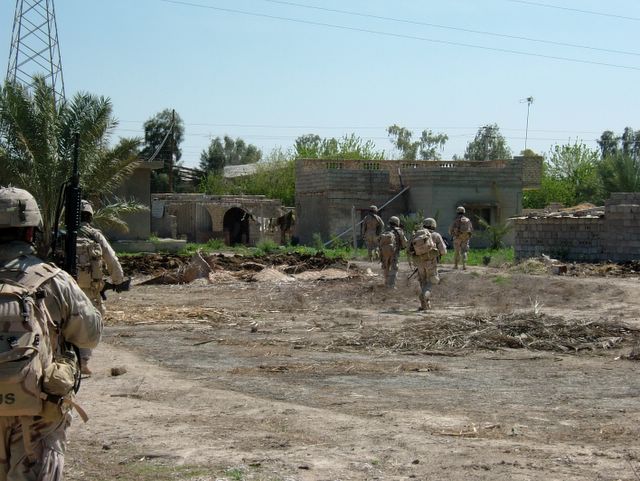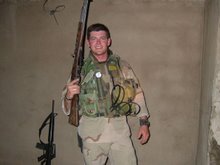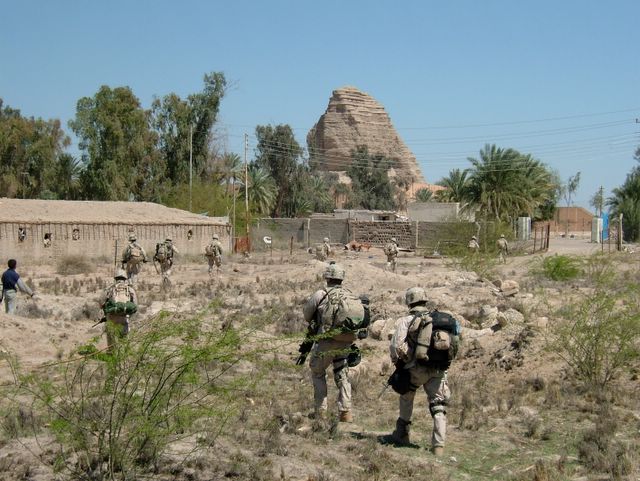The Washington Post
Israel Continues Deadly Airstrikes; Hezbollah Fires Scores of Rockets
By Anthony Shadid
Washington Post Foreign Service
Wednesday, July 19, 2006; A01
BEIRUT, July 18 -- By helicopter and ship, hundreds of Americans and Europeans fled on Tuesday from Beirut, ending its first week of siege, as casualties mounted in deadly Israeli raids that struck a Lebanese military base, a truck carrying food from Syria and a village near the border. The militant group Hezbollah fired at least 100 rockets into Israel, killing one civilian.
On a sweltering day, Norwegian, Swedish, Greek and British ships pulled into Beirut's harbor, most of them trying to load their passengers before nightfall. From a helipad at the U.S. Embassy overlooking Beirut, the dull thud of rotors announced the arrival of helicopters, which ferried passengers to the island of Cyprus, taking 30 people on each trip. Other U.S. citizens waited, growing more frustrated over having to endure another day of a conflict that has begun to impose a wartime logic in the city.
"I had to come and cry at the door of the U.S. Embassy, kissing hand and foot, telling them they must let me leave," said Raba Letteri, a child-care provider from Reston, Va., who was on vacation in Lebanon with her husband and two children.
They were living near Beirut's international airport, a swath of the capital barraged in Israeli airstrikes. Her 2-year-old son, Aaron, had a stomach infection. As they waited to board, he burst into tears. "This is the worst thing in my life," she said.
Through the day, Beirut itself was relatively quiet. Life returned to some streets so far unscathed by the attacks. Even traffic in the battered Shiite Muslim suburbs, Hezbollah's stronghold, trickled past the rubble of destroyed bridges and the shattered glass from apartment buildings that littered the streets. To some, the day was a brief respite as evacuations got underway. What might follow the foreigners' departure was a question many asked.
"I feel in my heart that after the foreigners leave, big problems are on the way," said Jamil Abu Hassan, a burly 56-year-old, loitering near the port. "Today, the embassies are taking their people. Tomorrow, the next day? God knows what will happen."
Hezbollah fired at least 100 rockets at Israel on Tuesday, including a large barrage an hour before sunset, striking about 10 towns and cities across northern Israel, from Haifa on the Mediterranean coast to tourist communities in the southern Galilee region. [Two big explosions reverberated over Beirut early Wednesday, and missiles hit towns to the east and south of the capital, the Associated Press reported.]
One Israeli was killed Tuesday in a rocket strike in Nahariya about four miles south of Lebanon on the coast, the Israeli military reported. Twenty-one people were injured. So far, in the fighting, 25 Israelis have been killed, including 12 soldiers.
[Israeli forces entered the central Gaza Strip early Wednesday and clashed with Palestinian militants, the Reuters news agency reported. Witnesses reported heavy gunfire near the Maghazi Refugee Camp, not far from the Gaza Strip's border with Israel. There were no immediate reports of casualties.]
Several rockets struck Haifa, Israel's third-largest city, about 22 miles south of Lebanon, where eight civilians were killed in a rocket barrage Sunday, the Israeli military said. The city's port remained closed for a second day because of the danger.
More than 720 Hezbollah rockets -- a small portion of the militant Islamic group's arsenal -- have struck Israel since hostilities began a week ago, when Hezbollah crossed the border and seized two Israeli soldiers. In the wake of the attack, Israel has unleashed a destructive military offensive that has killed more than 230 Lebanese, most of them civilians. The country's airport is closed, and the south is largely cut off from the rest of the country by wrecked roads and collapsed bridges.
The Israeli military said its jets flew about 110 raids over Lebanon on Tuesday, part of a campaign that has created competing narratives of the war. An Israeli military spokeswoman said the raids were targeting trucks carrying Hezbollah weapons, Katyusha rocket launchers in southern Lebanon, Hezbollah weapons storage facilities, bridges and roads used to transport weapons and fighters -- "all of this to damage the Hezbollah infrastructure," she said. In Lebanon, anger grew at the number of civilians killed and the dismantling of infrastructure that many Lebanese saw as their greatest achievement in the post-civil war era.
"This is a city of ghosts," said Adib Hourani, a 26-year-old gas station attendant, pointing down a deserted street.
In Aitaroun, a village near the Israeli border, a family of five was killed, although some witness accounts put the toll at nine. On the twisting mountain road to Damascus, an Israeli raid struck a truck carrying sacks of sugar and rice bound for Beirut, as well as two other large trucks, a pair of sedans and a four-wheel-drive taxi. In Kfar Chima, a Lebanese army base took a direct hit as troops rushed to bomb shelters, killing at least 11 Lebanese soldiers and wounding 35, the military said. Black fires stained nearby cinder-block tenements, and charred, twisted fenders, engine blocks and debris were scattered along the highway overlooking the base.
Israeli Prime Minister Ehud Olmert has said that Israel wants the Lebanese army to deploy to the border, now under the effective control of Hezbollah, but on several occasions, Israeli aircraft have targeted Lebanese military installations.
An Israeli military spokeswoman, Capt. Noa Meir, said the military was checking reports of the strike on the base, reiterating that Israeli forces were "doing everything we can to keep civilians and the Lebanese military out of harm's way."
Even the most optimistic Lebanese officials have acknowledged that diplomacy to end the conflict remains at its initial stages. British Prime Minister Tony Blair and U.N. Secretary General Kofi Annan have suggested that a U.N. force deploy to the Lebanese border. Annan said the force would have to be more effective than the current U.N. Interim Force in Lebanon, which was largely ineffective in stopping either Hezbollah or Israel.
Although some European countries have expressed support, both the United States and Israel have responded coolly, and Israeli officials, after meeting U.N. negotiators Tuesday, said that the campaign will not let up before the soldiers are released and Hezbollah withdraws from the Israeli border. For their part, Hezbollah officials seem to have become convinced that the stakes of the war have become much higher: a U.S.-backed Israeli plan to strategically realign the region.
To a striking degree, both the Israeli public and Hezbollah's supporters seem prepared for a longer struggle.
A poll in Tuesday's Yedioth Aharonoth, an Israeli daily, found that 86 percent of those surveyed said that the Israeli offensive against Hezbollah was "the right thing to do," and 81 percent wanted it to continue; 58 percent said it should continue until Hezbollah is destroyed, and 17 percent said they favored a cease-fire and the start of negotiations.
In Beirut's southern suburbs, where trash has piled up on corners and shops were almost uniformly shuttered, Abbas Fattuni sat with a friend smoking a water pipe in front of his auto parts store. They watched the traffic, enjoying the respite of bombing in the capital.
"We're nothing without the resistance," he said, as his friend nodded his agreement between puffs. "When a Lebanese dies, anywhere in the country, no one in the Arab world lifts a finger. Only the resistance takes care of them."
Across Lebanon, the siege began reverberating in people's lives. The price for items like kerosene for cooking and flour have all increased. Residents are withdrawing money from banks and trying to convert their Lebanese pounds into U.S. dollars, fearing a devaluation. The price of gasoline in the southern city of Tyre has increased more than sixfold.
"Six days, no sleep. We couldn't even buy bread," said Mirna Ballout, a 30-year-old Lebanese American who left Tyre on Monday and was standing outside the U.S. Embassy on Tuesday. "It's not fair -- whether it's for Hezbollah or whether it's for Israel. It's just not fair for the people living here."
Her two sons, Bassam, 7, and Yassine, 4, leaned against a suitcase. A few hours earlier, she comforted them after they thought a car door slamming was a bomb. Her daughter, 9-year-old Dana, held the handle of her pink Hello Kitty suitcase and recounted the days, her eyes wide with fear and surprise. "It's my first time," she said. "That was why I was really scared."
She smiled. "I hope this is my last time."
The helicopters ferried what the embassy called special cases on Tuesday -- the sick, elderly and families with young children. Officials said 136 American students studying at the American University of Beirut and the Lebanese American University were evacuated aboard a Norwegian vessel from Beirut's port.
U.S. officials said they believe they will have the capability to transport as many as 2,400 U.S. citizens out of Lebanon on Wednesday, using two civilian cruise ships and Marine Corps helicopters to ferry people to nearby Cyprus. The boosted evacuation effort could include the removal of more than 5,000 citizens by the end of the week.
State and Defense department officials said they have been limited to air and sea evacuations because they have deemed the roads leading out of the country into Syria to be too hazardous. The Orient Queen cruise ship, with the ability to carry 800 to 1,000 people, docked in Beirut on Tuesday night and was preparing to leave for Cyprus at dawn Wednesday. A second ship, slated to carry about 1,400 people, was also scheduled to be available Wednesday.
Vice Adm. Patrick Walsh, commander of the U.S. 5th Fleet, said sailors and Marines from the Iwo Jima Expeditionary Strike Group and the 24th Marine Expeditionary Unit had been ordered to the Mediterranean Sea to assist in the large-scale evacuation. Nine U.S. warships were headed to the region to provide security and, if needed, to help transport civilians to safety.
One of those departing was Adam al-Sarraf, a 20-year-old American from Los Angeles, who was studying Arabic at the American University of Beirut. His Iraqi-born father, working in Baghdad, had called to give him advice: Get off the fifth floor and stay in the basement. Watch out for the windows. The two planned to meet in Amman after the son was evacuated.
"The students really sympathize with the people here," Sarraf said, standing on the campus before his departure to the port, where he was to board a Norwegian ship. "We understand they're going through much more than we are."
Correspondent John Ward Anderson in Jerusalem, staff writer Josh White in Washington, and staff photographer Michael Robinson-Chavez and special correspondent Alia Ibrahim in Beirut contributed to this report.
© 2006 The Washington Post Company












